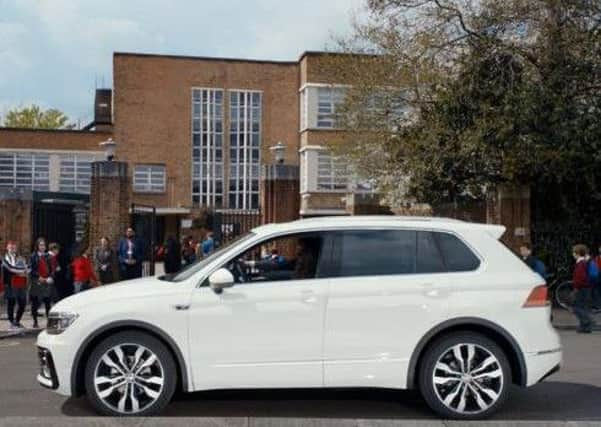Why making Tiguan better is no easy task


This is a model which has almost revered status. There are cheaper rivals but few cars come anywhere close to challenging Tiguan’s status as class-leading SUV (sports utility vehicles).
And with SUVs, or crossovers, now overtaking hatchbacks as the most in-demand breed of car in Europe, you can see why producing a new Tiguan is such a challenge.
Advertisement
Hide AdAdvertisement
Hide AdDifficult. But not impossible. As you might expect, changes to an already good car are fine improvements.
It is 33mm lower, which improves the ride and handling. It is 30mm wider, which makes it more comfortable; and it is 60mm longer which makes it drive better.
Doesn’t sound much? Well, when the car is already viewed by many as the best in class, improvements are always going to be more fine-tuning than redesigning.
But there’s more. Tiguan offers more in terms of what the motor industry calls connectivity. It’s an ugly buzzword but basically it means it is more intelligent and better linked to the internet than any previous model.
Advertisement
Hide AdAdvertisement
Hide AdStandard from entry will be a raft of valuable safety features designed to help the car park, ‘watch’ for pedestrians and have information such as satellite navigation and speed beamed up on to the windscreen.
The biggest improvement is the most difficult to see. It is the first Volkswagen SUV (sports utility vehicle) to sit on the Volkswagen MGB platform, which is the basis of the Golf.
The new car signals the start of a comprehensive SUV battle which will see the brand represented in all core SUV segments over time.
It isn’t perfect, though. Tiguan remains expensive when compared to the likes of Suzuki Vitara and Kia Sportage and the three-year warranty seems a little on the short side compared to rivals.
Advertisement
Hide AdAdvertisement
Hide AdThe inside does have a more premium feel than any previous Tiguan and the engine tested here - the familiar 2.0 litre diesel - is ideally suited, offering flexible performance, decent economy and good emissions.
It feels like a classy car with ‘ambient’ lighting and elegant door handles which look more like something you might see on a Range Rover than £20,000 to £30,000 car.
This interior offers more head room and knee room than previously – up by 29mm in the case of knee room – and when the rear bench is folded the cargo space, at 1,655 litres, is 145 litres larger than before. Meanwhile a lower load sill improves ease of use and underscores the Tiguan’s everyday utility.
The car also offers a sliding rear bench seat which allows up to 180mm of adjustment – 20mm more than in the previous model. When the rear bench is slid forwards, the boot provides 615 litres of space – a gain of 145 litres.
Advertisement
Hide AdAdvertisement
Hide AdThe extended engine range of the new Tiguan gives customers a great range of choices for power, style and comfort.
It will be offered with three new petrol engines, with power outputs from 125PS to 180PS, and four new diesel engines ranging from 115PS to 240PS.
The biggest seller is expected to be the 150PS diesel unit tested here. It comes as a two-wheel-drive or four-wheel-drive.
Among the hi-tech features are post-collision braking - where the brakes are applied after a crash to avoid further collisions - and lane assist, which keeps you on the straight and narrow.
Advertisement
Hide AdAdvertisement
Hide AdIt also has an ‘active bonnet’. This strange-sound device reduces the risk of injury to pedestrians and cyclists by lifting upward in the event of an impact – rising 50 mm within 22 milliseconds of an impact. The safety equipment roster also includes a network of seven airbags – including a knee airbag on the driver’s side. It sets standards, and not only for A-SUVs.
Tiguan is one of the five key pillars of the Volkswagen passenger cars brand sitting alongside Up!, Polo, Golf and Passat. Indeed, last year the outgoing Tiguan accounted for 21,889 sales here – up from 8,121 just four years before. Tiguan is now the third best-seller in the UK, bettered only by Golf and Polo.
The UK range will be badged using Volkswagen’s familiar S, SE, SE Navigation, SEL and R-Line designations, with diesel engines expected to account for around 95 per cent of sales.
Volkswagen Tiguan SE Navigation 2.0 TDI
PRICE: £27,380 on the road. Tiguan starts at £22,500
ENGINE: A 1,968cc four cylinder diesel engine generating 150ps
PERFORMANCE: Top speed 127mph and 0 to 60mph in 9.3 seconds
COSTS: Town 48.7mpg; country 67.3mpg; combined 58.9mpg
EMISSIONS: 125g/km
INSURANCE: Group 19E
WARRANTY: Three years, 60,000 miles